In the days before refrigeration, once a pig was killed, the meat was shared out among the extended family and the village neighbourhood, while every single part of the pig was cooked in various ways, ranging from soup and sausages to cooking fat and pork preserves (cooked pork sealed in fat, stored in ceramic pots - my father used to talk about this). These delicacies were eaten not just by the household to which the pig belonged, but the whole village. All the villagers who had a pig took their turn in staging the event, which was usually accompanied by singing. This tradition still survives among older residents, but the advent of refrigerators has helped in its demise, an understandable consequence of the conveniences of modern living.
One of the most unusual traditional dishes in Crete (and possibly, one of the smelliest) is pork cooked with celery, which is growing quite profusely in our garden. This variety of celery looks a lot like large-leafed parsley: this is dark green Greek celery, not the tall light green stalky variety (called Pascal celery) that one often conjures up in their mind when they hear the word 'celery'. Greek celery has a wilder appearance, a spicier taste, and a more pungent aroma than Pascal celery; you either love it or hate it. When this variety of celery is boiling away in the pot its aroma is as equally unappetising as that of cabbage or cauliflower. Its base consists of a hard thick white root which is edible, even tastier than the stalks and leaves. Greek celery is often added to soups; it's an absolute must in fasolada. It is usually sold in small bunches as a herb, but is also available in the tall shrub-like form. In Crete, the Pascal variety is often sold in the imported produce section of the supermarket (grown in Holland), and is referred to as σέλερι (pronounced 'celery'), but the Greek variety is always called σέλινο (pronounced 'selino').
The coastal resort town of Paleohora is located in the district known as Selino. As it is the main town in the area, it can be called the capital of Selino, prompting a school student to answer 'maintano' (parsley) when he was asked what the capital of Selino was...
This meal was a great success on both Christmas Day and New Year's Day. The meat and celery are cooked separately, eventually being combined in an egg-and-lemon sauce. The meat was very well cooked, the way Cretans usually like their meat, practically falling off the bone. Celery is quite resilient to water and needs a long cooking time to become tender enough to eat without that stalky woody taste that tough vegetables can have. It was boiled until it softened, without losing its crunchiness. The combination of heavy pork meat with the pungent selino herb creates an acquired taste. For this reason, many cooks have replaced the celery with a less pungent sweeter tasting wild green like stamnagathi, while the pork is replaced with lamb or goat. The same techniques apply in the cooking. Pork and celery can also be cooked in tomato instead of the traditional egg and lemon sauce that pork and celery is cooked in, but that's a question of personal taste.
Pork and celery hotpot constituted our Christmas meal for this year, cooked in my kitchen with the help of Mr Organically Cooked and a friendly neighbour. It gave me a chance to enjoy some peace and quiet on what is usually a busy day for the household cook. And if you're wondering why I'm still harping on about Christmas, in Greece, it hasn't ended: the last day of the Christmas period is Epiphany on the 6th of January, which - to confuse matters even further - is the official Christmas Day of the Eastern Orthodox Church which goes by the Julian calendar, instead of the Georgian calendar which is used to organise the year of the world calendar; the Greek Orthodox church uses the Julian calendar to calculate Easter Day, and the Georgian Calendar for all other festivals.
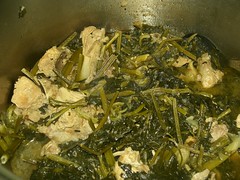
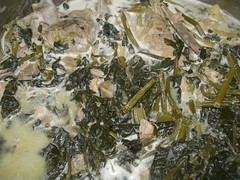
You need:
a kilo of celery, washed well and cut into small pieces; leaves, stalks and roots included - you may use other greens instead
a kilo of pork, trimmed of fat, and cut into small chunks - lamb or goat can replace the pork
1/2-1 cup olive oil (depending on how Cretan you feel)
2 large onions chopped small
2-3 cloves of garlic, minced finely (optional)
a glass of wine
salt and pepper
the juice of two large lemons
2 eggs
Boil the celery till it is soft and tender. The stalks may still be crispy, but the celery must be soft enough to be palatably edible - wild celery has a rather strong taste. Celery tends to be bulky, so use a large pot of water to boil it in. While this is happening, in another pot, pour in the oil, cook the onions (and garlic, if using), then add the pork chunks and brown on a high heat. Season with salt and pepper, and add the wine and just enough water to cover the meat. Place the lid on the pot and let the meat simmer away until it is cooked to your liking. We let the pork cook for over 90 minutes, adding water to the pot as it was needed to stop the meat from sticking to the bottom.
When the celery is ready, drain it well and add it to the cooked pork. Combine the celery and pork, and let it stew away for another 15 minutes for the flavours to blend. While this is happening, beat the eggs and lemon juice together in a bowl, to form a frothy yellow well-blended liquid. Turn off the cooker and remove the meat from the heat. Pour a small ladle full of the meat stock into the egg and lemon and stir it in well. You need to be quick in your movements here, because the egg will 'cook' if hot liquid is poured onto it. Continue to do this until enough meat stock has been blended into the egg and lemon mixture to make a well-blended soup-like liquid. Carefully pour this onto the meat and celery, and shake the pot to make sure it distributes evenly. Allow the flavours to blend a little before serving.
a kilo of celery, washed well and cut into small pieces; leaves, stalks and roots included - you may use other greens instead
a kilo of pork, trimmed of fat, and cut into small chunks - lamb or goat can replace the pork
1/2-1 cup olive oil (depending on how Cretan you feel)
2 large onions chopped small
2-3 cloves of garlic, minced finely (optional)
a glass of wine
salt and pepper
the juice of two large lemons
2 eggs
Boil the celery till it is soft and tender. The stalks may still be crispy, but the celery must be soft enough to be palatably edible - wild celery has a rather strong taste. Celery tends to be bulky, so use a large pot of water to boil it in. While this is happening, in another pot, pour in the oil, cook the onions (and garlic, if using), then add the pork chunks and brown on a high heat. Season with salt and pepper, and add the wine and just enough water to cover the meat. Place the lid on the pot and let the meat simmer away until it is cooked to your liking. We let the pork cook for over 90 minutes, adding water to the pot as it was needed to stop the meat from sticking to the bottom.
When the celery is ready, drain it well and add it to the cooked pork. Combine the celery and pork, and let it stew away for another 15 minutes for the flavours to blend. While this is happening, beat the eggs and lemon juice together in a bowl, to form a frothy yellow well-blended liquid. Turn off the cooker and remove the meat from the heat. Pour a small ladle full of the meat stock into the egg and lemon and stir it in well. You need to be quick in your movements here, because the egg will 'cook' if hot liquid is poured onto it. Continue to do this until enough meat stock has been blended into the egg and lemon mixture to make a well-blended soup-like liquid. Carefully pour this onto the meat and celery, and shake the pot to make sure it distributes evenly. Allow the flavours to blend a little before serving.
Pork and celery in this lemony sauce is one of those stomach-friendly meals that are very beneficial for those who have been fasting, as custom dictates for the forty days before Christmas. A good alternative to egg and lemon sauce in the pork and celery is to serve the sauce as a thick dressing; serve the cooked pork and celery and let your guests decide if they want to dress it with the egg and lemon sauce.
This is my contribution to Weekend Herb Blogging, hosted by Pam from The Backyard Pizzeria.
©All Rights Reserved/Organically cooked. No part of this blog may be reproduced and/or copied by any means without prior consent from Maria Verivaki.

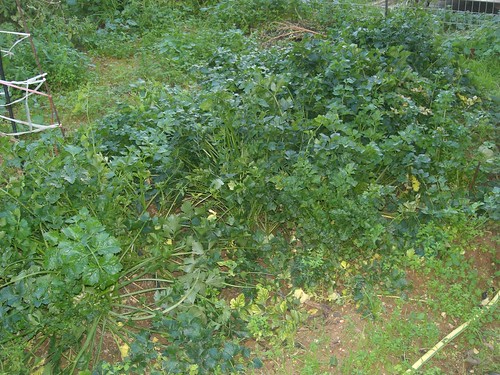
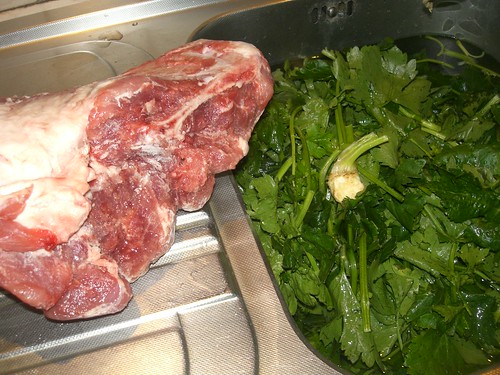
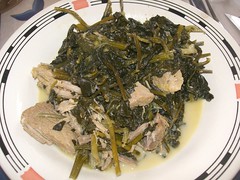
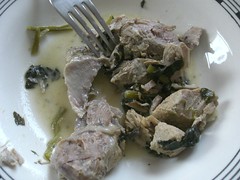
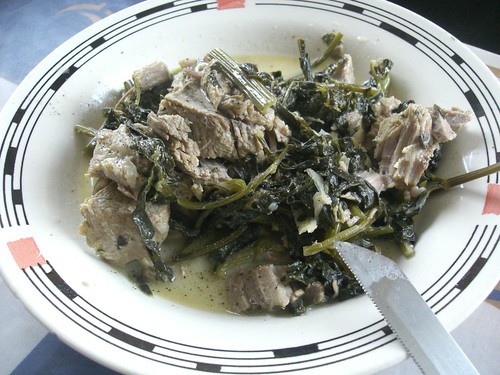
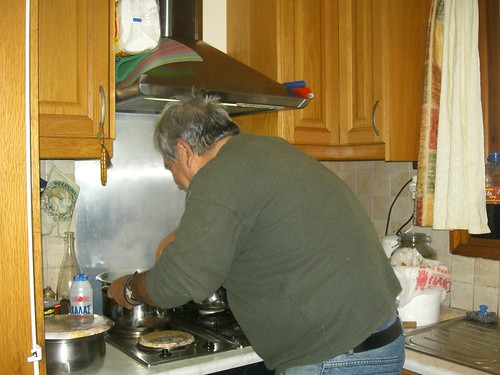
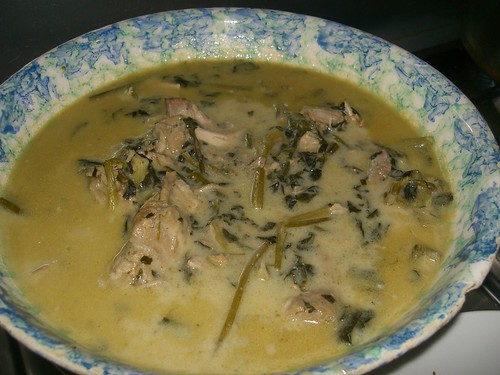
Ooooh yeah, I'll take a large serving of that with the sauce. Mr. Organically Cooked and your neighbor did a terrific job! I am a huge pork fan (as are most folks in the US), and that lemon sauce of yours is totally addictive. Pork, whether it be chops, roast, loin, ribs, and all ham and bacon products, are very popular in the US. Cooking them until the meat falls of the bone is one of the more popular methods, and recipes for pulled pork, BBQ, etc., are always well loved. I've not heard of this stew or of this type of celery before. The celery variety over here is the very mild type that would dissolve into the stew after more than 30 minutes of cooking. Gee whiz, I wish my spoon could reach through the screen. Also, my family celebrates the Epiphany, too. Afterward, all the holiday decorations will come down and be stored away until next year. I was surprised to learn that you fast before Christmas. We only fast during Lent, the 40 days before Easter. As a kid, we fasted every Friday, but that's really not observed anymore. Since my littlest one can't eat wheat, she can't receive the host at communion. I need to talk to the Priest about this to see what other options there are for her. She could receive the wine, but it's a community cup and, well, it kind of grosses me out a bit! :-) Happy Epiphany!
ReplyDeleteMy parents often made this in Australia (minus the avgolemono)...as a kid I wasn't that impressed but as an adult I love it. Especially with lots of bread for mopping up the juices.
ReplyDeletewell, i don't fast myself, but the way we eat at home is very similar to fasting, since we don't cook a lot of meat (i'm very touchy on that subject). most people will fast a few days before christmas, but not necessarily the whole 40 day period
ReplyDeleteWahh, half lamb for $20 :O You were soo lucky...I also value lamb the highest, short after crispy chicken and duck, but $20 for THIS much? Even if this was in the 70ies...
ReplyDeleteI thought only we Irish used that type of celery! We use it in our vegetable soup.
ReplyDeleteYou can buy a bag of soup veg from a greengrocer here and all you need to add is barley and dried peas to make vegetable soup.
mmmmmmm especially since it was cooked by Mr Organic!!Food always tastes better when someone else cooks!
ReplyDeleteHappy Theophany!
Both my parents speak of the slaughter of the pigs in the village each winter. Everything was used, except for the squeak!
ReplyDeleteMy complements to Kir-Andrea and his fabulous looking hoirino me selino.
Thanks for the recipe. This looks so good for winter!
ReplyDeletedrooll....pork. Looks beautiful and sounds awesome.
ReplyDeleteI had several versions of this, all made with the wrong kind of celery - but when I finally had it with selino, I became a convert. So good. When I did the version for the cookbook, I had to make it a bunch of times before I was satisfied - too bad Andreas wasn't around!
ReplyDeleteI make this quite often - I always look for the celery with the most leaves! I also add silverbeet. Rather than making the egg sauce I just cook it with lots of lemon juice. Have to put feta in to serve! This reminds me of the four years i spent in Greece, its one of my favourites - and its cooking in the crockpot as we speak!
ReplyDeletecooking in a crockpot is a nice way of doing it too - i can imagine the aroma when you open up the pot. i also like the idea of cooking it only in lemon, as it is a heavy dish
ReplyDeleteA childhood meal I remember well, it was in my nannas recipe book which grew legs one day and never found its way back to our home.... So happy to have found the proper taraditional version I remember.... ROLL on winter.... Yummmmmmmy!!!
ReplyDelete